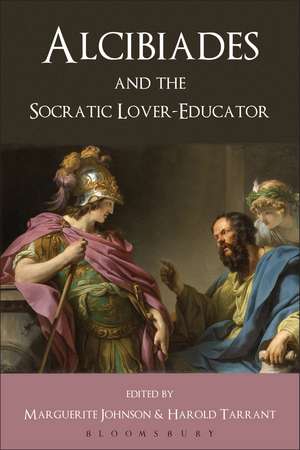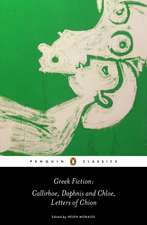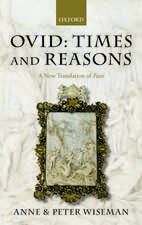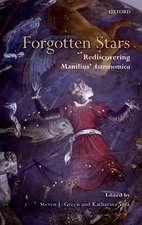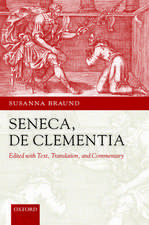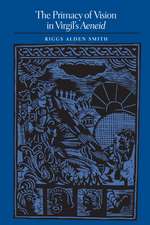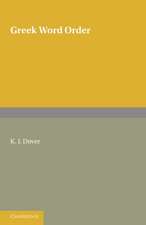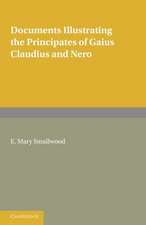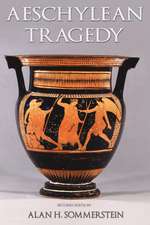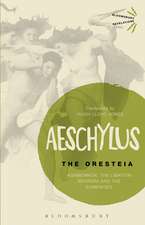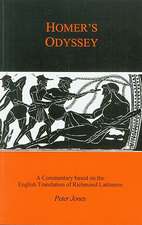Alcibiades and the Socratic Lover-Educator
Editat de Harold Tarrant, Marguerite Johnsonen Limba Engleză Hardback – 15 feb 2012
| Toate formatele și edițiile | Preț | Express |
|---|---|---|
| Paperback (1) | 257.76 lei 6-8 săpt. | |
| Bloomsbury Publishing – 6 noi 2013 | 257.76 lei 6-8 săpt. | |
| Hardback (1) | 949.98 lei 6-8 săpt. | |
| Bloomsbury Publishing – 15 feb 2012 | 949.98 lei 6-8 săpt. |
Preț: 949.98 lei
Preț vechi: 1217.01 lei
-22% Nou
Puncte Express: 1425
Preț estimativ în valută:
181.80€ • 188.65$ • 151.95£
181.80€ • 188.65$ • 151.95£
Carte tipărită la comandă
Livrare economică 15-29 martie
Preluare comenzi: 021 569.72.76
Specificații
ISBN-13: 9780715640869
ISBN-10: 0715640860
Pagini: 272
Dimensiuni: 156 x 234 x 28 mm
Greutate: 0.57 kg
Editura: Bloomsbury Publishing
Colecția Bristol Classical Press
Locul publicării:London, United Kingdom
ISBN-10: 0715640860
Pagini: 272
Dimensiuni: 156 x 234 x 28 mm
Greutate: 0.57 kg
Editura: Bloomsbury Publishing
Colecția Bristol Classical Press
Locul publicării:London, United Kingdom
Caracteristici
Covers the background to the work; its arguments and the philosophical issues it raises; relationship to other Platonic texts, and its subsequent history up to the time of the Neoplatonists.
Notă biografică
Marguerite Johnson is Senior Lecturer in Classics, University of Newcastle, Australia. Harold Tarrant is Professor of Classics, University of Newcastle, Australia.
Cuprins
IntroductionHarold Tarrant, University of Newcastle, Australia and Marguerite Johnson, University of Newcastle, AustraliaThe role of Eros in Improving the Pupil, or What Socrates Learned from SapphoMarguerite Johnson, University of Newcastle, AustraliaSocrates and Models of Platonic LoveDougal Blyth, University of Auckland, New ZealandThe Eye of the Beloved: Opsis and Eros in Socratic PedagogyVictoria Wohl, University of Toronto, CanadaPlato's Oblique Response to Issues of Socrates' Influence on Alcibiades: An Examination of the Protagoras and the GorgiasReuben Ramsey, University of Newcastle, AustraliaSocratic Ignorance, or the Place of the Alcibiades I in Plato's Early WorksYuji Kurihara, Gakugei University, TokyoDid Alcibiades Learn Justice from the Many?Joe Mintoff, University of Newcastle, AustraliaThe Dual-Role Philosophers: An Exploration of a Failed RelationshipAnthony Hooper, University of Sydney, AustraliaAuthenticity, Experiment or Development: The Alcibiades I on Virtue and CourageEugenio Benitez, University of Sydney, AustraliaRevaluing Megalopsuchia: Reflections on the Alcibiades IIMatthew Sharpe, University of Melbourne, AustraliaImprovement by Love: From Aeschines to the Old AcademyHarold Tarrant, University of Newcastle, AustraliaIce-Cold in Alex: Philo's Treatment of the Divine Lover in Hellenist PedagogyFergus King, University of Newcastle, AustraliaProclus' Reading of Plato's Sôkratikoi Logoi: Proclus' Observations on Dialectic at Alcibiades 112d-114e and ElsewhereAkitsugu Taki, Josai International University, JapanSocrates' Divine Sign: From the Alcibiades to OlympiodorusFrançois Renaud, Université de Moncton, Canada'The Individual' in History and History 'in General': Alcibiades, Philosophical History and Ideas in ContestNeil Morpeth, University of Newcastle, AustraliaAppendix 1. Fourth-Century Politics and the Date of the Alcibiades IAppendix 2. Report on the Working Vocabulary in the Doubtful Dialoguesa. The Working Vocabulary of the Alcibiadesb. The Working Vocabulary of the Theages Bibliography Index
Descriere
This collection of scholarly papers covers aspects of the context and background to Alcibiades I; the philosophical issues it raises; its relationship to other Platonic texts, and its subsequent history.
